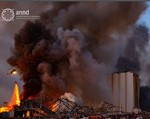Statement by Lebanese and Regional CSOs
Published on Thu, 2020-08-13 14:35
Statement prepared by Lebanese CSOs after Beirut’s Explosion, the statement is addressed to International Organizations, the United Nations Agencies and International Partners. On August 4, 2020, Beirut was hit by the biggest explosion in its history, leading to more than 200 killed, seven thousand wounded, and tens of missing (according to the latest figures by the Ministry of Public Health) before the Lebanese army announced that it would stop the search for the missing in addition to causing disabilities and increasing the suffering of people with disabilities in general. Download pdf version in English or in Arabic. 1. Beirut Explodes On August 4, 2020, Beirut was hit by the biggest explosion in its history, leading to more than 200 killed, seven thousand wounded, and tens of missing (according to the latest figures by the Ministry of Public Health) before the Lebanese army announced that it would stop the search for the missing in addition to causing disabilities and increasing the suffering of people with disabilities in general. The explosion also led to billions of dollars in economic losses (the damages have not been surveyed yet) added to the accumulated losses of nearly US$90 billion, as the country goes through a deep economic, financial, and social crisis, putting its economy on the brink of total collapse. The social repercussions of the explosion are major. Around 300 thousands of families lost their homes, establishments, and livelihoods. The fragile food security situation brought about by the financial crisis and Covid-19 has become more precarious after the destruction of the granaries and all the imported goods stored at the port. The health sector faces a major crisis, due to the damage caused to three major private hospitals in Beirut, who had to suspend their work, leading to a significant decrease in the capacity of the sector, which is dependent for the most part on private establishments. Furthermore, Covid-19 cases have been rising rapidly and warehouses storing the chronic medications distributed freely by the Ministry of Health and international organizations were destroyed. These are some of the immediate consequences of the blast, awaiting the results of accurate scientific studies of the direct and indirect impact on the Lebanese economy, which was in the middle of an unprecedented crisis. Dollar exchange rates have been soaring as the country faces hyperinflation (inflation rates exceeded 50% a month over a period of 30 consecutive days). The collapse of the economy is accelerating and cannot be halted through the partial and ad-hoc interventions of a government, which faces its own and no-less dangerous political and institutional crisis. 2. A Political Crisis The explosion was caused by the presence of 2,750 tons of Ammonium Nitrates, used in manufacturing fertilizers and explosives, at the Beirut port since 2014, without any attempts to move them despite warnings of the danger. Consecutive governments, the Port of Beirut, customs and security forces had knowledge of the presence of dangerous chemicals at the port. The explosion, thus, was not an accident. It is a blatant crime whose responsibility falls on the political, security and administrative authorities overseeing the work of the port, appointed and protected by political forces. The blast was inevitable, waiting to happen whether by accident or on purpose. Regardless of the direct cause or the nature of the spark of this evil that fell upon Beirut, the real reason is that of all the crises that befell the country since the end of the civil war, the failed political class has been sharing the spoils and accumulating wealth. It contributed to the impoverishment of its people, denying them of their economic, social, civil, and political rights, and now, killing them directly. Faced by massive issues, people in Lebanon have lost trust in the authorities and the current government, which they hold responsible for the explosion. There is absolutely no trust in any investigation by authorities that failed to solve much simpler crises or prosecute those responsible for the disasters afflicting Lebanon and its people. Those responsible for the catastrophe should not be in charge of the investigation of its causes or recovering from its effects, including receiving aid, managing relief operation, renovation, or reconstruction. 3. Recommendations The Lebanese people responded immediately to this disaster. Hundreds of individual and collective initiatives and thousands of volunteers from all regions ran down the affected areas to provide assistance. The inaction and absence of state institutions was a reminder of previous crises. This comprehensive popular solidarity is Lebanon's true wealth. It is the one that must be built upon, strengthened, and provided with support to overcome this crisis far from the institutions of corruption, clientelism, and political parading. Accordingly, the civil society organizations signatories to this statement invite the international community to:
Signatories in Alphabetical Order From Lebanon
Supporters From the Region
Beirut, 13 of August 2020 |
SUSCRIBE TO OUR NEWSLETTER



